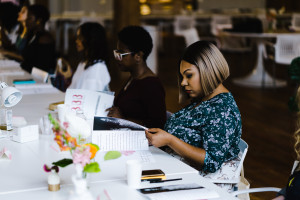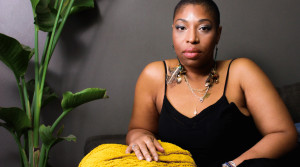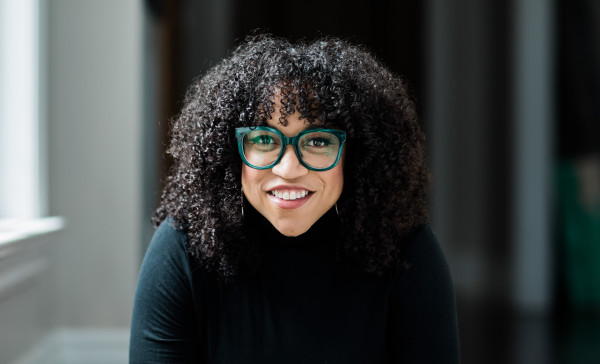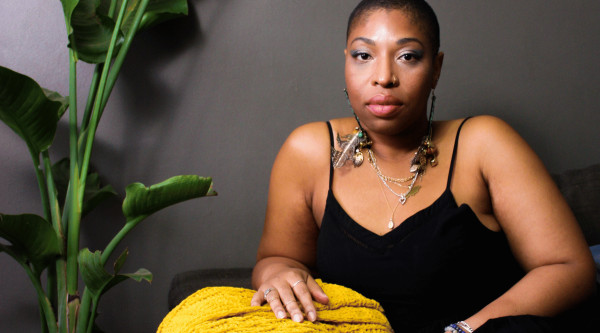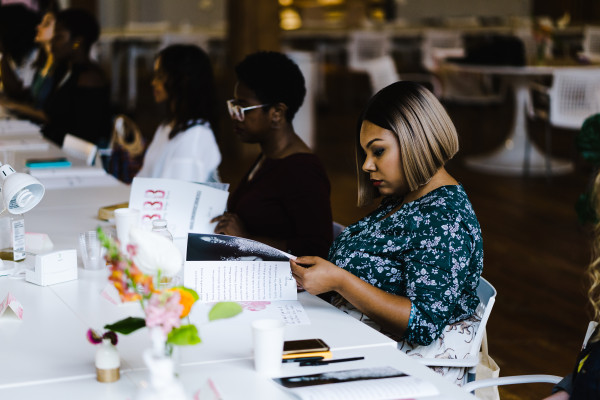What made you decide to seek a traditional publisher and agent?
Charlene: All of the [challenges], and then when I became a mother, balancing the writing, running a publishing business, and also trying to be a present [parent] was just too much. Something had to go, and it certainly wasn't going to be my daughter or the writing, so the answer became clear: If I wanted to keep writing, I had to find other people who would pay me to write and handle the majority of the non-writing aspects.
{https://www.instagram.com/p/Cn-VnIYPiHE/?utm_source=ig_web_copy_link}
Kern: I wanted more support. I experienced the amount of work necessary to sell books as a self-published author and felt like if I still put in that work but had a team that was also dedicated to helping me sell books, then my chances of success would rise exponentially.
Kevin: I had always been shopping and receiving rejection letters before self-publishing. I wanted to have traditional publishing because there was always a stigma around self-publishing, that you weren’t good enough to be recognized, and I hated that. Despite having confidence in my work, that validation was important to me, especially when writing fiction. It was important to have the backing of the machine. That they could assist with distribution and reach readers that I might not be able to get through direct sales as I did with poetry.
Yolanda: After self-publishing five books, I had the manuscript for My Soca Birthday Party: with Jollof Rice and Steel Pans ready. I shared the story with my boss then and was advised not to self-publish that book. My boss was able to share the manuscript with the CEO of Chalkboard Publishing. The publisher researched my work history, how I marketed my books, and the video and ads I ran to make my last self-published book, Miles Away in The Caribbean, a top seller. The publisher made me an offer and requested that I submit all other manuscripts I have. In 2019, I received a multi-book deal with Chalkboard. In 2020, I was approached by my agent, and I agreed to be agented.
{https://www.instagram.com/reel/CplF3-cA_xB/?utm_source=ig_web_copy_link}
Rahma: When I first wrote my picture book: Dear Black Child, I began looking for an agent to get a traditional book deal. I felt I could self-publish, but I wanted this book to have a greater reach than self-publishing could not allow.
Sadé: I decided to seek an agent because I wanted to have connections with major publishing houses so my books would be available in bookstores to reach a wider audience. Having an agent and a publisher provides major advantages that self-published authors may not have access to, such as being eligible to join certain organizations and other beneficial connections that will enhance an author's career. In addition, the publishing companies, agents and publicists already have a rapport with bookstores and other major book companies, so their authors will have an advantage from the beginning. I also don't have to use my own money to create a book, and I can have an income from advances and royalties.
How did traditional publishing change your writing career? What was one noticeable difference you found being traditionally published?
Charlene: It's still a lot of time and effort, but now I'm making a liveable income from it and don't need to pursue outside work. Rather than essentially being an independent publisher, my core focus is on writing and connecting with readers. It also has expanded the reach of my books in incredible ways.
Kern: It gave me confidence. It was validating to have a publisher pay for my manuscript because that showed me they valued it. The one noticeable difference is getting into festivals. I've been included in two major literary festivals since signing my deals. These festivals are great because they expose my work to new audiences and other authors who become supporters.
{https://www.instagram.com/reel/Cpyd0D6DZCD/?utm_source=ig_web_copy_link}
Kevin: I’d say that being traditionally published boosted my confidence. It put my book into libraries and schools that my self-published books may not have reached. It gave me a better understanding of the publishing process. When beginning my publishing company, I had to learn a lot on my own through experience. I had to wear all of those hats or hire someone outside to do those things. So there is more hustling involved when self-publishing, but I also learned very quickly that traditional publishing does not take the place of the hustle. You’ve still got to do many of the same things, but more people are ready to assist. The acquisition editors, copy editors, proofreaders, project managers and publicists are each there to help maximize your project.
Yolanda: As a traditionally published author, I get into literary spaces, which offer more extensive distribution and notability. I am working harder than I did as a self-published author because I have to produce multiple manuscripts for my agent, meet editing deadlines the publisher sets, market my books and remain informed on the industry.
Rahma: Although I do not feel more or less of an author than before my recent book, I feel I am finally seen as a "real" author in the industry. Unfortunately, self-published authors are not given the same respect, recognition and access to awards or grants as other authors. As a traditionally published author, I can now apply for more grants, I am eligible for literary awards, and I got a book advance for my manuscript.
{https://www.instagram.com/p/CjDzoYWJj57/?utm_source=ig_web_copy_link}
Sadé: Being traditionally published changed my writing career because I don't have to stress about certain things, such as perfectly editing my manuscripts or illustrating my books. I now have a professional assigned to those tasks. I also have the name of a highly respected and accredited publishing company behind me. I am also more motivated to continue writing and producing more books because the money is not coming out of my pocket. The expenses of self-publishing can be a lot, which is pretty stressful.
One noticeable difference in being traditionally published is that people now tend to take me more seriously. I'm not sure why that is, but they do.
How do you feel about many Black authors choosing self-publishing first instead of pursuing traditional publication?
Charlene: From my observations, the past couple of years seem like an incredible opportunity for Black authors. I see many books by Black authors featuring Black stories, and I know from deal notices that many more are on the way.
Kern: Self-publishing is great for authors to understand what it means to write, promote, and sell books. This understanding was crucial for me, so I don't see a downside to self-publishing. What I want Black writers to understand, however, is that self-publishing is a lot of work. You need to market your book and network with booksellers constantly to increase your distribution platforms. It's not easy, but you'll learn so much about the industry and your capabilities.
Kevin: It’s not a surprise that I believe pre-pandemic and George Floyd, there wasn’t much interest in publishing Black authors as much as there is now. Self-publishing allows you full control of the message that you want to convey, whereas some publishers may want to edit out some of the fire that you bring. So I see why Black authors would rather self-publish than dilute the message. So far, I haven’t had any issues with the traditional publisher trying to quiet my voice, but I can see my colleagues fearing that as a real point of contention.
{https://www.instagram.com/reel/Ck68EkKsou8/?utm_source=ig_web_copy_link}
Yolanda: I know why many opt for this path; it is very tough to get traditionally published. Also, for some, self-publishing is strictly business on their terms. Having total control over their work and sales is their goal. I highly recommend that Black Canadian self-published authors learn about the publishing industry—network with publishing professionals who can offer valuable information and great connections.
Rahma: I see self-publishing as an act of resistance. Unfortunately, many Black self-published authors do not get the recognition and respect they deserve for doing the incredible work they do. However, I have also seen the growth of indie authors; some make more money in indie publishing than in trade publishing, which is amazing.
Sadé: I can totally understand why many Black authors choose the self-publishing route; however, I would love to see more Black authors being traditionally published. There is always the excuse in publishing that there is not a large demand for BIPOC books and that is why they are not being published and supplied. If more Black authors can be traditionally published, that excuse will dissolve, and there will be more supply of Black literature. But at the same time, I'm sure most of the Black authors tried to get traditionally published and were not given the time of day, so they decided to self-publish instead.
{https://www.instagram.com/p/CovWPH1vc21/?utm_source=ig_web_copy_link}
The authors:
FSP: First Self-Published Book
MRTP: Most Recent Traditionally Published Book
UT: Upcoming Titles
Charlene Carr (Halifax-based, FSP: When Comes the Joy, 2014; MRTP: Hold My Girl, 2023)
Kern Carter (Toronto-based, FSP: Thoughts of a Fractured Soul, 2014; MRTP: Boys and Girls Screaming, 2022; UT: And Then There Was Us, 2024; Is There A Boy Like Me, 2024)
Kevin Heron Jones (Toronto-based, FSP: Vision, 2001; MRTP: Half Court Trap, 2022)
Yolanda T. Marshall (Toronto- based, FSP: Obayifo, 2008; MRTP: Christmas Elves Being Themselves, 2022); Brown Girl in the Snow, 2024)
Sadé Smith (Brampton-based, FSP: Super Mom, 2016; MRTP: Granny’s Kitchen, 2022; UT: Julie and the Mango Tree, 2023)
Rahma Rodaah (Edmonton-based, FSP: Muhiima’s Quest, 2017; MRTP: Dear Black Child, 2022; UT: Dear Muslim Child, 2024)
NEW RELEASES
Akim Aliu: Dreamer
Akim Aliu and Greg Anderson Elysée
Scholastic
Release Date: February 4, 2023
In the Belly of the Congo
Blaise Nadal
Simon & Schuster
Release Date: February 21, 2023
Writes That Sputter: Poems
Britta Badour
Penguin Random House
Release Date: March 21, 2023
Lilla May Journal
June Smith
Self-published
Release Date: March 28, 2023

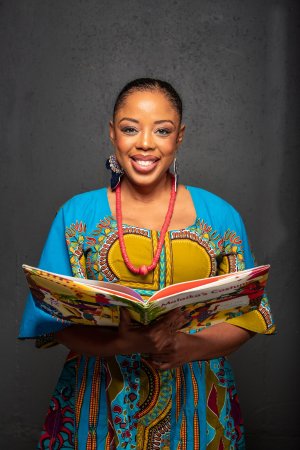 By
By 




